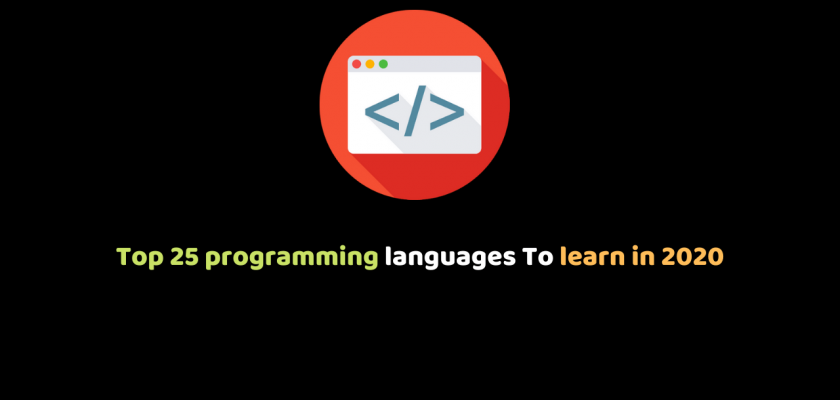In this article, We have collected the top 25 programming languages To learn in 2020
In today’s technological world it is very important to learn how to write down a computer program.
Every sector has been using a computer for their jobs as they help in scaling up the business.
The programming department is developing at a faster pace when compared to previous times.
They have developed a lot of new programming languages that suit every developer.
Every individual can use these languages for every type of software.
But there is a very common and serious question amongst each of us. It is that which programming language should an individual use.
This is the list in which I have given the name of all those 25 programming languages which everyone can use. So, let us begin with it!!!
1. Go
Go programming language is also known as golang. It is developed in 2009 by Robert Griesemer, Rob Pike, and Ken Thompson. It provides excellent support for multithreading.

Pros
- It is ideal for making single-page applications
- Fast as it compiled to machine code
- Cleaner syntax makes it very easy to learn
- Backed by Google
- The extensive library offers a range of built-in functionality for working with primitive types
Cons
- Lacks versatility
- Absence of a machine makes complex programs less efficient
- Implicit interfaces
- No GUI library
- Underprivileged library support
2. Python
Python language is founded by Guido van Rossum. He released it in the year 1991. So, this one inevitably tops the list as Python is one of the most accepted programming languages.
It is fast, easy-to-use, and is widely used for developing scalable web apps. YouTube, Pinterest, SurveyMonkey, Instagram, etc. are the software made using Python.
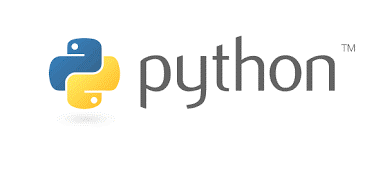
Pros
- Easy-to-use and very fast
- Focuses on the code readability
- Offers support to a huge amount of platforms
- Ideal for building prototypes and then testing ideas
- Extensive library support
Cons
- Cannot use for mobile computing
- Threading is not good
- The database access layer is not matured
3. Java
James Gosling found it at the Sun Microsystems in the year 1996. It has prevailed for so many years and is a choice of many large organizations.
Java is commonly used to develop enterprise-wide web apps.
It is highly stable and many large companies love it. If you’re searching for a growth-based job in a large organization, Java is the language you need to master. It is also commonly used for Android App Creation.
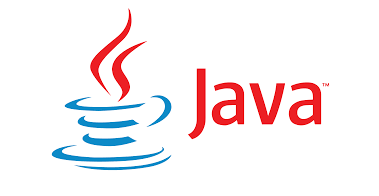
Pros
- A high degree of the platform independence to the JVM feature
- Helps in multithreading
- Provides a large number of APIs for completing tasks such as the networking, and XML parsing
- Has the stack allocation system
- Abundant open-source libraries
- Follows the OOP paradigm
Cons
- Lack of template limits on producing high-quality data structures
- Costly memory management
- slower than compiled programming languages, such as C and C++
4. R
Robert Gentleman and Ross Ihaa designed R at the University of Auckland. This project began in the year 1992 but the first version came in 1995 and the stable beta version in 2000.
It is most commonly used for Data Analysis and Machine learning. It provides an excellent built-in library to develop a very powerful learning algorithm.
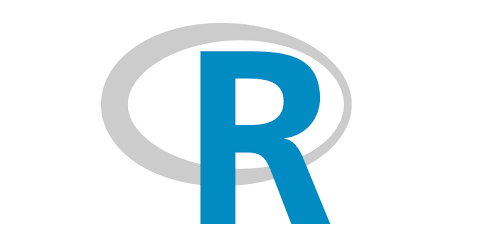
Pros
- Comprehensive statistical analysis language
- It is highly extensible
- Powerful package ecosystem
- Has the ability to run seamlessly on the various operating systems
Cons
- There is no strict guideline for programming
- Poor memory management
- Lacks security features
5. Swift
Apple created it in July 2010 to avoid iOS developers from working with objective-C. Apple iPhone with the help of Swift has made a significant share in the market. It is giving competition to Android.
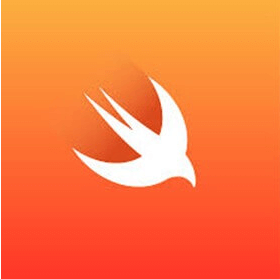
Pros
- Developed by Apple
- Very easy to add new features
- It is fast compared to other programming languages such as Python and Objective-C
- Possible to integrate server-side swift with technology
- The English-like syntax makes it readable
Cons
- No support for the legacy projects and only iOS7 can use it
- Limited community support
- It is a bit unstable because it is a new arrival on the programming scene
6. JavaScript
JavaScript was formerly named as LiveScript. It was first launched with Netscape Navigator 2.0 in September 1995. Eventually, later on, it became JavaScript. JavaScript is commonly used for the creation of interactive frontend software. For example, when you click a button that will open a window, the logic will be done via JavaScript.
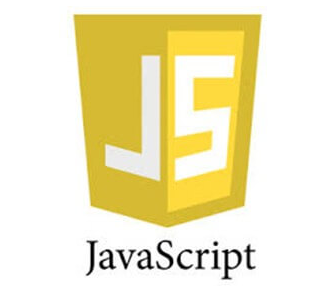
Pros
- Simple implementation
- Many resources and huge community support
- Very versatile
- Provides a rich interface to the website
- Main programming language of the web
- Reduced website server demand
Cons
- Provides an only single interface
- It can interpret in different ways by various browsers
- No copy available
- It executes the code on the user machine, many users disable JS due to fear of exploitation.
7. Dart
Google developed it for designing the user interface (UI). It focuses on how an application looks and feels to users. Dart is very similar to JavaScript which is one of the most popular programming languages. Flutter is one of the most popular growing framework built on the Dart.
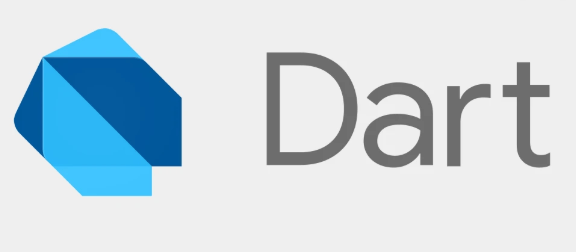
Pros
- Code can be sent across the websites, mobile, and API
- Easy-to-use when used for C-style syntax
- Super friendly and helpful for the large community
Cons
- Many generic domain packages need to be there for supporting the core domain
- Backend focus very low
8. Kotlin
JetBrains designed Kotlin programming language and it appeared very first in the year 2011. It is an open-source, statically types programming language which is for the Android and JVM.
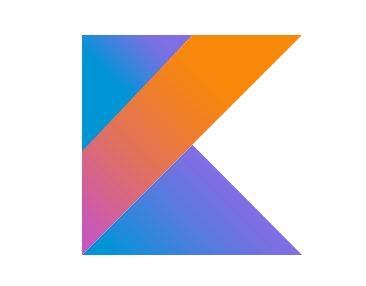
Pros
- It is clear and compact which helps in increasing the team efficiency
- Easily maintainable
- Stable and consistent
- Consistent with Java and all the related tools
Cons
- Not so easy to work
- Fluctuation compilation speed
9. Rust
It is a programming language with a multi-paradigm. It focuses on safety and safe concurrency. The Creator of Rust is Graydon Hoare and was first released in 2010. It has surpassed the rules and has excelled in delivering the best results. It is an open-source and Mozilla Foundation maintains it.

Pros
- Supports concurrent actor, object-oriented, and pure functional programming styles
- Also supports the generic programming and metaprogramming
Cons
- Its memory management makes recursion leak
- Lack of efficient garbage collection
- Cannot work as fast as Python or Ruby
10. C#
The first version of C# released in 2001. It is a general-purpose language that is found by Microsoft. It is for backend programming, building window, creating games, etc.
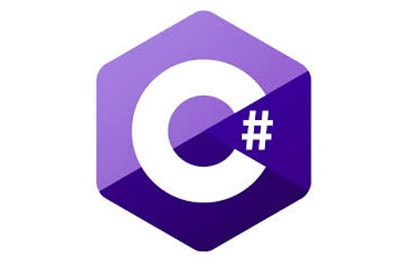
Pros
- Scalability increases automatically and it is upgradable
- Ability to work with shared codebases
- Follows the syntax similar to the C language
- It is ideal for all the windows development
- Has the rich set of library functions
- Quick compilation and execution time
- It is safer than C and C++
Cons
- It is less flexible than C++
- Requires expertise and knowledge for resolving errors
- Allows the pointers in ‘unsafe’ blocks
- Requires effort and time to learn
11. PHP
Rasmus Lerdorf created PHP in the year 1994. It is one of the most famous backend programming languages. It faces strong competition from Python and JS. The market still requires a large volume of PHP developers.
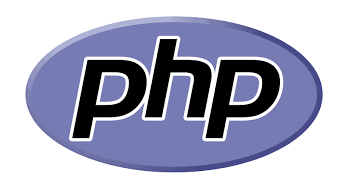
Pros
- It is very easy-to-use PHP
- Supports Object-oriented and functional programming
- It is a good system of automation tools needed for testing and deployment
- First-class debugging with the Xdebug
- Abundant powerful frameworks
- The large open-source software community
Cons
- It lacks security
- Poor error handling
- Requires extension for a greater extent
- Process of developing websites in PHP is slower when compared to the use of other options
12. SQL
Raymond F. Boyce and Donald D. Chamberlin found SQL at IBM. This programming language was out in public in 1979.
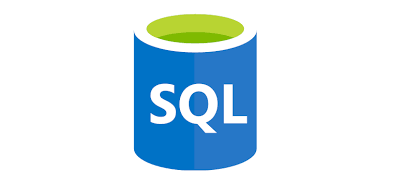
Pros
- Powerful query language
- Optimized for a large number of table sheets
- Quick for data search and query
- High data quality and accuracy
- Fast data recovery from multiple tables
Cons
- It can run on a single server, so performance requires updating your hardware
- Since SQL databases operate on a single server. So, if the server stops working, then one cannot access the database.
13. Perl
It is a high-level, interpreted, and dynamic programming language. Larry Wall designed Perl in the mid-1980s. It is still one of the main languages. It is for developing reports and scripts on the UNIX systems. It is also used for processing large text files and then uses them in GCI.
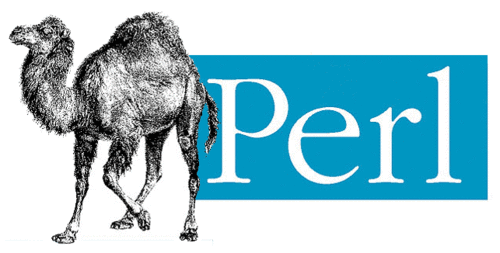
Pros
- More Multi-purpose Language
- Versatile
- Looks like Shell Language
- Powerful Programming Language
- Follows Traditional Approach by using Braces for Loops and functions
- Can be Imperative, Functional or Object-Oriented
Cons
- No Interpreter Shell
- Argument Handling is poor
- Is slower for a lot of tasks
- Has untidy code
- Creates a problem when the codes are larger say more than 200 Lines
14. Ruby
Ruby was first designed and built by Yukihiro “Matz” Matsumoto in Japan in the mid-1990s. It focuses on productivity and simplicity. Ruby has an elegant syntax which is natural to read and write.

Pros
- It is an efficient framework which is easy-to-use
- Lets you create high-end web software which is very flexible
- It helps in writing the code in a few lines and in a comprehensive way
Cons
- Runtime speed is very slow which deteriorates the performance
- Cost very high if any wrong architecture planned
15. Lisp
Lisp is a short form of List Processor and John McCarthy is the creator. It is the second-best and oldest high-level programming language.
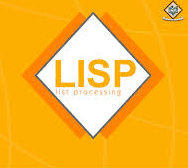
Pros
- Can manipulate even a liver server for updating small changes
Cons
No community support
- Very fewer libraries and few implementations
16. Pascal
It is an influential and procedural programming language that came in 1968-1969. It got published in 1970 by Niklaus Wirth so as to encourage good programming practices. Pascal is a very clean programming language and looks more like a real language.
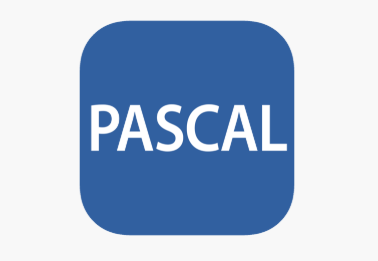
Pros
- Real assignment operator
- Object-oriented programming
- Well-structure programming language
- A lot of scope for working
- High readability
Cons
- High use of reserved words
- Limitations in using language
- Less popularity
17. MATLAB
MATLAB is a statistical tool used for data collection in different industries. It is also commonly used in the computer vision and image processing industry.
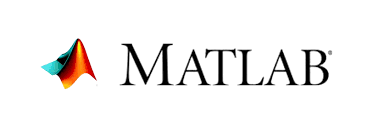
Pros
- High efficiency and productivity of coding, as no compiler is for execution
- It allows the conversion of code for use in other computer languages, such as Java, C++, and Python
- Development of scientific simulation thanks to a large built-in library
- Platform-independent
- Functionality can be greatly extended by incorporating toolboxes
Cons
- Cannot deal with failures produced during cross-compilation requires extensive experience and knowledge
- Need to purchase a license for use
- Not much scope for the application
18. HTML 5
HTML 5 is a scripting programming language. It can help with front-end web development tasks. It is the last standard of the HTML markup language. Various websites like YouTube have been using HTML 5 for their video playback needs.
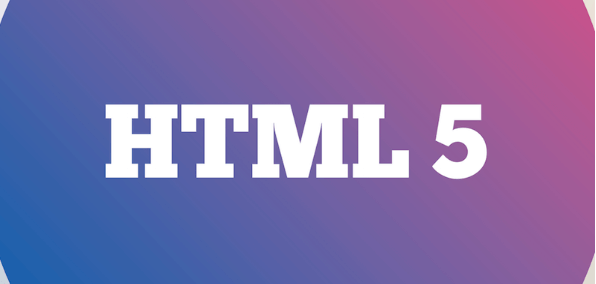
Pros
- Provides an extensive library for making the performance improvements
- Interactive feature for creating a website and mobile apps
- Takes less time and efforts
- Supports offline access
Cons
- Cannot support the old browsers
- Has a certain restriction on the multimedia
- Lack of security in relation to the website applications
19. TypeScript
It is an open-source programming language that is created by Microsoft. It’ first release was in the year 2012. TypeScript is for the large applications and can transcompile to JavaScript. It is also supported by Microsoft’s free code editor.
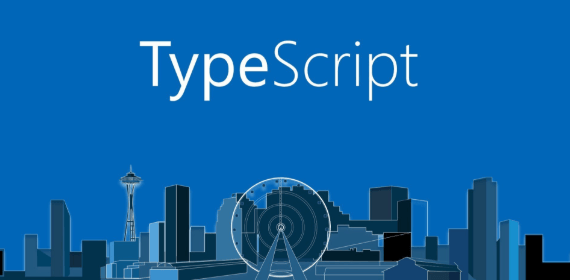
Pros
- Has a good set of Object-oriented programming
- It does not need a runtime plugin
- The backend developer can feel more comfortable with it
- Uses popular frameworks
Cons
- Hard to keep up with it as it is highly saturated with different frameworks
- Needs development tooling
- Content Management Systems cannot edit it
20. CRYSTAL
Crystal is another emerging general-purpose programming language. It is also a compiled language that has taken its syntax inspiration from Ruby.
Actually, it has the aim of mixing together the elegance of language Ruby with the speed and efficiency of compiled languages. It is open-source and free. It uses advanced global type inference that makes it faster at the back end. Also, it makes it more efficient with the code.

Apparently, this is how simple and elegant it is to program in Crystal language. This is why it is the most promising language of 2018.
Pros
- It is concurrent. It uses green threads concepts, called fibers. They communicate with each other without sharing memory.
- It also has a null reference check, type system and macros for meta-programming.
- People call it-“Fast like C, sleek like Ruby.”
21. JULIA
Julia is a dynamic and easy to use language. It is slowly developing into one of the strongest languages of this era. Julia has all the good points in it in a programming language. It is an open-source, fast and optionally type programming language.

Pros
- It supports multi-paradigm environments such as OOP and functional programming.
- Very useful and efficient in data visualization. This makes it “a language of tomorrow.”
- Julia consists of a data ecosystem that allows the users to upload complex data sets very quickly.
- It gives powerful tools for deep learning and concepts of artificial intelligence, such as Flux.jl and Knet.jl
22. ELM
The last on the list is the browser designing language Elm. It compiles into JavaScript and is a purely functional language.
Elm implements persistent data structures such as an array, set, etc. Apparently, it comes in modern day-to-day graphical user interfaces.
Elm is further support in HTML, CSS, and JavaScript. This is how coding in Elm looks like-

Pros
- It is more expressive as a browser language than the ones existing already.
- No run time errors as it is a functional language.
- It has a well-created code that avoids semantic and syntax errors.
- Also, it is versionary, that is, it can convert the codes of different versions of this language on the same common platform.
- The compiler suggests a solution to the problem along with the error message.
23. C++
Bjaren Stroustrup developed C++ in the year 1983. This programming language is the bread and butter of the programming. All the low-leveled systems are with C++. It also provides Standard Template Library (STL). The STL is a collection of readymade libraries for data structures and algorithms.

Pros
- A selection of compilers and libraries to work with
- There’s no garbage collector running all the time.
- Faster program execution than most of the programming languages
- Programs are more effective and easier to manage
Cons
- No strict checking
- Is not an easy first choice
- Complex syntax
- Does not support program namespace
24. C
An American computer scientist named Dennis MacAlistair Richie created this programming language. It got its release between 1967 and 1973. It is very popular and used extensively.

Pros
- Provides a degree of Portability
- Runs very close to the system hardware
- It forms the basics of programming languages
Cons
- Unable to solve real-world programming challenges
- Create high-level constructs
- No strict checking
- Memory Corruption
25. Clojure
Clojure is a dialect of the Lisp programming language and primarily runs on a Java virtual machine.

It also implements ClojureCLR which runs on Common Language Runtime (CLR), and ClojureScript, which compiles to JavaScript.
It emphasizes a functional programming language with immutability at its core. All data structures of Clojure are immutable.
Conclusion
This is all about the top 25 programming languages to learn in 2020. We have also given some detailed information about each of them.
Each of them has their own mark in the world of programming.
They will provide a lot of opportunities for the huge market. Likewise, you can use each of them or consult with the correct person and choose one for you.


